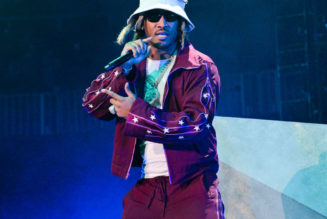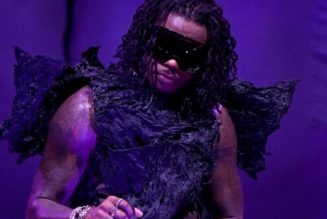Brandi Carlile is happy to expound upon bad wine. Bad wine gives her a hangover. The pretension of wine culture leaves a bad taste in her mouth. “Without sounding like I’m judging wine as a concept, it’s annoyingly bougie and culturally hetero,” she says with a laugh. “It’s like golf.”
So when it came to developing her own boutique wine label, XOBC, she knew what she did want. It would be a wine for folks who are “a little left of center.” Something a bit rugged — maybe for a camping trip, to be sipped out of a Solo cup — “but it’s not going to give you a f–king headache.” And like everything Carlile does, it wouldn’t just be good — it would do good, too.
Because Carlile and her wife, Catherine Shepherd, started XOBC with their married friends Amy and Jeri Andrews, the company is entirely women- and LGBTQ-owned. Its grapes come from vintners in her home state of Washington, where she still lives with Shepherd and their two young daughters, Elijah and Evangeline. It’s even inclusive of those who don’t drink alcohol: Because Carlile saw her father’s struggles with alcoholism throughout her childhood (he eventually got sober), she insisted on adding Misfit Mist, a hop-infused carbonated water, to XOBC’s offerings. In March, to celebrate the LGBTQ+ community, Carlile planned to release Proud Sparkling Rosé. Then, just three days before, the Florida state legislature passed the Parental Rights in Education bill — aka the “Don’t Say Gay” bill — aimed at criminalizing classroom instruction about sexual orientation and gender identity for younger students.
As she recalls it today, Carlile’s mood turns sober. Recently, 7-year-old Evangeline was named student of the month and brought home a poster board to fill out about her family. She could write about how one of her moms is a nonprofit savant who previously ran Paul McCartney’s charitable foundation and about how the other has six Grammy Awards. But “I suddenly realized,” Carlile says, “that whole thing was against the rules in Florida. I don’t want that to be the reality for my child — but I don’t think there’s a difference between my child and anybody else’s.” She knew what to do: The Proud release was delayed, and its profits are now 100% funneled toward LGBTQ+ organizations fighting discriminatory bills. “We’re blinded by this insatiable need to do the right thing,” says Shepherd. After all, she points out, Carlile’s fans “expect a certain level of thought that goes into everything Brandi lends her name to.”
From the moment her career began in the late 1990s, Carlile’s name has been inextricable from activism. The simple act of being an openly queer country artist was, at the time, radical, even in her hometown outside of progressive Seattle. But even then, Carlile never only championed herself: Following her breakout 2007 single, “The Story,” she harnessed her newfound fame to launch the Looking Out Foundation (LOF) with her lifelong bandmates, twins Tim and Phil Hanseroth, to raise funds for causes and organizations in need of a supporting voice as strong as her own. “[Her impact is] multigenerational, and it cuts across LGBTQ+, men and women, and all kinds of genres,” says Bonnie Raitt, one of Carlile’s heroes and a mentor when it comes to organically blending activism and art. “Her talent and her fire are unmistakable.”

As her profile rose and her albums made a slow-burn climb up the Billboard charts — reaching an apex with 2019’s By the Way, I Forgive You, which peaked at No. 5 on the Billboard 200; yielded her stunning ode to the underrepresented, “The Joke”; and garnered six Grammy nods and three wins — Carlile also became an expert connector between generations in the artist community, supporting its elders (with Shooter Jennings, she produced Tanya Tucker’s Grammy-winning While I’m Livin’ in 2019 — and powered a Tucker appreciation campaign in the process) and keeping its departed legends’ legacies alive. (She’s a constant presence at major tribute concerts, for everyone from John Prine and The Everly Brothers to Chris Cornell and Aretha Franklin.)
“What impresses me about her is she still always finds time and a way to be there for things she cares about,” says Gregg Nadel, co-president of Elektra Music Group, where Carlile is signed. “Our whole label has this feeling of wanting to do right by her because it’s a two-way street — it’s a communal relationship.”
And at this point, Carlile’s business is so tightly woven to her beliefs that the more she thrives, the more her activist work does, too. Her consistently solid touring business has allowed her to donate $2 from every ticket to organizations like The Trevor Project and the anti-police-violence platform Campaign Zero. The proceeds from her 2017 album, Cover Stories (on which the likes of Dolly Parton, Pearl Jam, Adele and Miranda Lambert covered Carlile’s songs), were entirely donated to War Child UK. A purchase of her recent single “Party of One,” featuring Sam Smith, still delivers a portion of proceeds to Children in Conflict. Even the XOBC wine label was created in part to benefit LOF — which it did just as the pandemic halted touring and, overnight, stripped the foundation of its main revenue generator.
Even then, Carlile didn’t turn her focus inward. At The Compound — the roughly 80 acres of land where she lives among family and friends in Maple Valley, Wash. — her team rallied to build a makeshift studio in Carlile’s barn and broadcast intimate solo acoustic livestreams to raise money for her crew and LOF. The Bramily, as Carlile’s fans are affectionately known, “were incredibly generous in times of need,” Shepherd says, “where you would think people would be panicking and keeping their resources to themselves.”

Carlile is able to do all this because her compassion has been a core part of her personality since day one. “Brandi is fearless with a strong, golden moral compass,” says Duffy McSwiggin of Wasserman Music, her agent of 20 years. “When you’re moving in the right direction, it contributes to that fearlessness.” But even that compass has, on occasion, faltered. In her 2021 memoir, Broken Horses, Carlile describes a protest over the 2017 “Muslim ban” where she had been asked to perform Bob Dylan’s “The Times They Are A-Changin’ ” — and immediately felt questioning stares as the only white woman standing onstage among Muslim immigrant activists. “If you’re not cringing at this point in the story,” Carlile writes, “just picture me squeezed onto a mostly melanated, largely marginalized community’s stage … in my cowboy hat holding an acoustic guitar.”
So she kept to the side of the stage and, when the speakers began experiencing technical difficulties, got on her hands and knees, untangling wires until others’ voices were properly amplified. Being an ally, she realized, “is more than stepping out of the way. It’s more than saying nothing,” Carlile says today. “It’s being willing to be embarrassed and willing to ask questions. It’s putting yourself in that crowd, taking that risk.”
Joy Oladokun remembers the moment she first met Carlile. At the 2021 Newport Folk Festival, the rising queer singer-songwriter was rehearsing for Allison Russell’s Once and Future Sounds set, in which she would be playing alongside Chaka Khan, when Carlile made a surprise appearance — and pulled Oladokun aside to praise her work.
“She didn’t have to take me aside and encourage my work and production, but she did,” Oladokun recalls. “She’s a champion of people through and through. That’s her power.” She and Carlile instantly bonded over their experiences of growing up queer in very religious places. “It’s like a tattoo on a young mind that you spend your whole life trying to impact,” Carlile says, adding that her activism was in large part inspired by feeling utterly rejected in the church community because of her sexuality. “You can’t do it alone.”
So Carlile found ways to build community elsewhere. Her trip to Newport was brief — she flew out expressly to support Russell and had to hop on a plane right after to visit longtime friend Elton John in Paris — yet she still insisted on gathering Russell’s cohort (including, briefly, Khan herself) for a post-set boat ride and oysters. For a Black, queer Nashville artist like Oladokun, that felt huge, and perfectly aligned with the many ways Carlile makes less well-known artists feel seen.
“When we’re not in the room together, I feel so confident that Brandi is advocating for me,” Oladokun says, noting how Carlile will regularly drop her name — as well as those of other up-and-coming artists she admires — on talk shows where she’s ostensibly promoting her own work. “[Oladokun] represents our community of activists in such a way that it’s undeniable that we’re making progress,” Carlile gushes. “I’m thinking about [that progress] all the time. That’s how I remember to name-check.”

She knows firsthand just how powerful that kind of platform can be: As an opener herself for many years, “My objective always was to show up at that gig and grab ahold of those fans and take them with me,” Carlile recalls. “I’ve done that in such a way that it’s going to last a lifetime.” Now that she’s a headliner, she’s determined to provide that kind of spotlight to others who need it, whether they’re talented younger artists (her tour support has included rising stars Amythyst Kiah and Katie Pruitt, as well as collaborators like Lucius and Lucie Silvas) or veterans deserving of their flowers while they’re still active (Mavis Staples has also opened for her).
One of the biggest platforms Carlile uses, no surprise, is one she created herself: her destination festival, Girls Just Wanna Weekend. Since its 2019 debut, thousands of fans have flocked to Riviera Maya, Mexico, as much to see Carlile as the vibrant, diverse group of women artists she introduces and often joins onstage — from Nashville innovators like Yola and Ruby Amanfu to outspoken stars like Margo Price and Maren Morris and trailblazing veterans like Tucker, Sheryl Crow and Indigo Girls. The 2023 festival has already sold out without a single artist announced.
McSwiggin, Carlile’s agent, brings valuable expertise from working on similar events with touring powerhouses like Dave Matthews Band and Phish; still, he says, putting together Girls Just Wanna Weekend each year takes a lot of “elbow grease” and depends upon the deeply loyal fan base that knows any Carlile show will be “a safe space to be yourself.” At the close of each weekend, Carlile can dependably be found right in the midst of the Bramily, tequila bottle often in hand. (She loves it almost as much as wine.) In shimmering leggings, headbands, high ponytails and other questionable ’80s get-ups, she, her team and her fellow performers let loose to the Ladies of the ’80s DJ set — or, as Carlile puts it: “I get totally sh-t-housed onstage and then usually end up dancing in a hot tub fully clothed without my shoes. That’s just tradition.”
Moments like that are Carlile to a tee, says Shepherd. “Brandi doesn’t like experiencing any joy without sharing it with people,” she says. And those people don’t just include her fans and the other artists she can help, but the artists who’ve helped her, too. Ever since Carlile caught a guitar pick that said “No nukes” at a Raitt show as a teen, she has sought out meaningful relationships with the artists she considers her teachers.
“Bonnie’s activism is action-based, but it’s also philosophical,” says Carlile, who wrote Raitt a letter early on in her career as a fan and has stayed close with her since. “She lives her activism.” Likewise, John — whose own foundation focuses on the global AIDS epidemic — is a hero turned friend. Before she ever heard his music, Carlile says, “I knew about his heart and his activism and how intertwined it was with his music. My young mind was wrapped around that concept before I was an artist or an activist.”
“There’s not really anyone else I can think of that is the den mother for musicians and causes the way Brandi is,” says Raitt. “One of the great joys of the last few years has been growing our friendship through her incredible help with Joni Mitchell — organizing salons at Joni’s house to help Joni come back from her brain aneurysm [in 2015].”

Since meeting Mitchell at the retired singer’s 75th-birthday party, Carlile has helped organize and invite musicians to these “Joni Jams.” Despite not publicly performing anymore, Mitchell was eager to put her home full of instruments to good use and has since hosted stars like Raitt, John, Parton, Herbie Hancock, Harry Styles and Jacob Collier. Each night, Carlile says, includes some “headache” wine, a home-cooked meal by Mitchell’s friend Chef Steph and time to ask Mitchell questions; then everyone heads to the living room to pass around Mitchell’s instruments, play and occasionally hear Mitchell sing both her own songs and covers. “She has even gotten to know some of the lyrics to my songs,” Carlile marvels, “so she pipes in on mine, which is surreal.”
“I love her!” Mitchell says of Carlile. “She’s my ambassador.”
Sometimes, Carlile will visit on her own to run new music by Mitchell, who’ll sit and play solitaire. “She is back to mentoring, and she has found a way to make the things that have happened to her a blessing for other people,” says Carlile. After two decades in the music industry, Carlile has done plenty of mentoring, too. Yet she still sees herself as the kid at the knee of legends, intent to make sure everyone in her tribe remembers where they came from.
“Culturally, I think we discard our elders. I don’t want to call them ‘elders’ because some of them could beat me in a footrace — but ageism is real,” says Carlile. “I want to make sure everyone remembers the foundations of the things we enjoy so we don’t become untethered to our way-pavers.”
Mid-May is shrimping season in Washington — and when it comes to shrimp, Carlile is dead serious.
Each day, she’ll write a note to her girls’ teachers excusing them from class so they can assist in the endeavor. “I need their limit,” Carlile protests with a laugh, explaining there’s a limit of 80 shrimp per person, and “the kids are people!” So she’ll prop Evangeline and Elijah on the bow of the boat, drop pots down and take home upwards of 200 shrimp per day for Compound-wide barbecues.
Carlile, who just turned 41, admits that her wife is “constantly rolling her eyes at how much time I want to be with [the kids]. When I was younger, it used to be work, work, work. I’d get to the end of these tours, and I’d be all strung out on sleeping medication and steroids and having panic attacks and not knowing why I was so unhealthy,” she continues. “I had no footing.” Now she’s determined to savor the little moments of family life: building fires in their old wood-burning stove, making dinner at night, trick-or-treating (most recently as a Legend of Zelda-themed quartet).
That’s easier said than done. Between recording, touring and running a wine label and a foundation, the business of being Brandi Carlile is 24/7. She built a career by saying yes to everything, and she works as hard as she asks anyone to work for her. “I have an addict mentality that I probably got from my dad,” Carlile figures; if she’s not on the road or with her family, she’s out fishing in her hip waders or wielding a power drill for someone’s remodel on the Compound. It’s the same work ethic that took her from busking under the clock at Seattle’s Pike Place Market to hitting that high note in “The Joke” at the Grammy Awards. And so, “despite every therapist’s wish for me,” Carlile says, “I’m doubling down on it because it feels like my lane.”

Red Light Management’s Will Botwin was president of Columbia Records in 2004 when the label signed Carlile based off a handful of songs she played at a showcase. (She moved to Elektra in 2017; five years ago, Botwin rejoined Carlile’s team as a manager.) He didn’t anticipate it would take nearly two decades for her breakout success with By the Way, I Forgive You, but he did see the commitment it would take.
“She is a throwback artist in terms of the way she has developed,” says Botwin, who still recalls the days when Carlile would play “every night in any club that would have her.” Growing her fan base, songwriting talent and public persona organically for years meant that “when her moment started arriving, she was ready.”
In 2019, Carlile took home the best Americana album Grammy for By the Way, two additional trophies for “The Joke” — and a much wider audience after her on-air performance of the song. “I don’t know an artist who has ever been more present and more joyful doing a song like that on a big show, and it resonated with people,” says Botwin.
After that, the doors swung wide open for Carlile and, as the saying goes, the rising tide lifted all boats. According to Billboard Boxscore, between 2018 and 2019 — pre- and post-Grammy night — Carlile more than doubled her average concert attendance from 2,385 to 5,557 per show. Even with a limited number of shows in 2021, that average spiked again to more than 9,000. And triple the number of tickets sold meant triple the donations to LOF.
“You notice the donations increasing anytime she’s in the spotlight, whether she is delivering a message of activism or not,” Shepherd says. Shepherd has led LOF since 2012, when she left her position as McCartney’s charity coordinator to move to the United States with Carlile. During her decade with McCartney, she saw how grown men consistently lost their cool, dropping their briefcases to stand next to him — and how he never let the “Beatle effect” go to his head. “He was really good at reminding people he was just a normal person who likes bagels for lunch,” says Shepherd, “and Brandi is really good at putting people to ease in that respect.”

Carlile’s gratitude for the Grammys and how they furthered her activism was boundless until last year, when the Recording Academy announced that her 2021 single “Right On Time” would be slotted into the best solo pop performance category, not Americana. “The Grammys changed my life. They gave me the most life-changing opportunity, not just for me but for a lot of people,” says Carlile. But being moved out of the Americana genre “pissed me off,” she says.
“I can’t even begin to express how important it is to me to stay with [the Americana community],” Carlile continues, “even if it means levels of success that I’ll never reach.” She had decided long ago that achieving pop stardom wasn’t nearly as important as making change in her small corner of the industry — and suddenly, she found herself far from it. “When the Grammys made that decision for me,” she says, “it felt like I had been taken out of my space that I wanted to be in.”
Olivia Rodrigo took home the award, and Carlile’s frustration has since subsided. She’s quick to acknowledge that the categorization was also “a great compliment. I had to look at the juxtaposition of those two issues and come to a peaceful place with it,” she says. There was something cool, she admits, about being “in pop with all them kids.”
And even with that category relocation, she still managed a very Brandi Carlile 2022 Grammys. She garnered four other nominations: two more for “Right On Time,” one for best American roots performance for her feature on Brandy Clark’s “Same Devil” and a song of the year nod for her Alicia Keys collaboration, “A Beautiful Noise.” In true Carlile fashion, “A Beautiful Noise” was recorded to encourage voting in the 2020 election and created by an all-female songwriting team. And thanks to that, two of the writers got their first-ever Grammy nomination, including Ghana-born artist Amanfu — a Girls Just Wanna Weekend alum. Carlile hopes artists will one day be able to define the categories in which they’re placed. In the meantime, she’ll keep helping them do so far from awards show stages.
“Communities are so important,” she says. “You should be able to choose which one you’re a part of.”

This story originally appeared in the June 4, 2022, issue of Billboard.
[flexi-common-toolbar] [flexi-form class=”flexi_form_style” title=”Submit to Flexi” name=”my_form” ajax=”true”][flexi-form-tag type=”post_title” class=”fl-input” title=”Title” value=”” required=”true”][flexi-form-tag type=”category” title=”Select category”][flexi-form-tag type=”tag” title=”Insert tag”][flexi-form-tag type=”article” class=”fl-textarea” title=”Description” ][flexi-form-tag type=”file” title=”Select file” required=”true”][flexi-form-tag type=”submit” name=”submit” value=”Submit Now”] [/flexi-form]










Tagged: Cover Story, entertainment blog, FEATURES, music, music blog, Pride